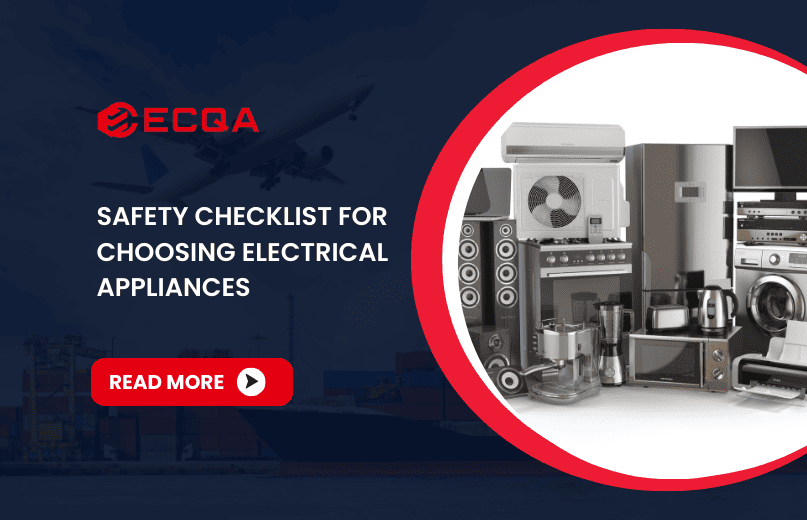
Safety Checklist for Choosing Electrical Appliances

Recently, Temu’s updated compliance policy has placed substantial responsibility on sellers to ensure their electrical appliances meet stringent safety standards set by European regulatory bodies.
To provide some context, Temu is an online shopping platform owned by Pinduoduo, a major Chinese e-commerce company. Launched in the U.S. in September 2022, it rapidly gained popularity, boasting 50 million monthly users by early 2024. It competing with traditional discount retailers and online giants such as Amazon.
Safety Checklist for Choosing Electrical Appliances
Choosing the right electrical appliances is crucial for both consumers and businesses, particularly as regulatory standards become more stringent. Ensuring electrical safety and compliance not only protects users but also helps mitigate risks associated with electrical shocks, electrical fires, and other hazards. Here’s a safety checklist to guide your decision-making:
1. Verify Manufacturer’s Reputation
Always purchase electrical devices from reputable manufacturers or well-known brands with a proven track record of quality and compliance. Look for customer reviews and third-party endorsements to assess their reliability.
2.Check the Product’s Safety Features
Inspect for built-in safety mechanisms such as automatic shut-off, overheat protection, and surge protection. Ensure the appliance has proper insulation to reduce the risk of electrical shock. Additionally, check for features like ground fault circuit interrupters and circuit breakers to protect users from electrical hazards.
3. Confirm Proper Voltage and Plug Type
Verify that the appliance’s voltage is compatible with the standards in your country or region. For international markets, confirm the compatibility with electrical outlets, extension cords, and power outlets. Inadequate connections may pose risks, including electrical fires or shocks.
4. Assess Build Quality and Materials
Ensure the appliance is made from durable, high-quality materials that can withstand long-term use. Avoid products with loose parts, electrical cords, or sharp edges that may pose physical hazards or create safety issues when interacting with electrical systems.
5. Review the User Manual
Ensure the product includes a clear and comprehensive user manual. The manual should contain instructions for safe use, troubleshooting tips, and warranty information. Be sure to follow electricity safety tips and safety guidelines when operating the appliance to avoid accidents such as overload outlets.
6. Look for Certification Marks
Certified products guarantee compliance with safety and quality standards, ensuring they meet industry regulations and consumer protection requirements. Certification marks, such as CE, UL, or ISO, indicate that a product has undergone rigorous testing and meets specific performance, safety, and environmental standards.
Key Safety Certifications for Electrical Appliances
1. CE Marking (European Economic Area)
The CE Marking is a certification for products sold in the European Union (EU) and the European Economic Area (EEA). It ensures the product complies with EU regulations for electrical safety, health, and environmental impact.
2. UL Certification (United States and Canada)
UL (Underwriters Laboratories) certification is a globally recognized standard for safety and performance, particularly for electrical devices sold in North America. It confirms that the product has been tested for potential hazards, including electrical fires, and meets strict safety criteria.
3. RoHS Compliance (Restriction of Hazardous Substances)
The RoHS Directive ensures that electrical and electronic equipment are free from hazardous substances that can harm human health or the environment. Initially introduced in the EU, RoHS has inspired similar regulations worldwide
4. CB Scheme (International)
The CB Scheme is a multilateral agreement among certification bodies that simplifies the approval process for electrical products in multiple markets. This certification is accepted in over 50 countries, including the EU, US, China, and Japan.
Understanding the significance of certification is crucial when selecting electrical appliances. Certifications like the CE Marking, UL, RoHS, and CB Scheme are not only regulatory requirements but also guarantees of quality, electrical safety, and environmental consciousness.
By adhering to these safety guidelines and certifications, both manufacturers and consumers can contribute to a safer and more reliable marketplace. Whether you’re buying or selling electrical devices, these certifications ensure the product meets international safety standards, providing peace of mind and fostering consumer trust. Additionally, being mindful of overload outlets, electrical wiring, cords under rugs, and underground power lines will ensure safety at home and in the workplace.

 Request Free Sample Report
Request Free Sample Report